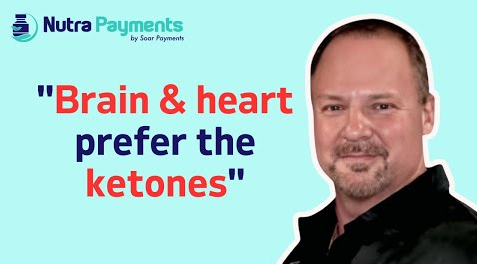Not All Low Carb Diets Are Keto
Read the original article here.
When most people think of keto, they think of low carb. While ketogenic diets are low carbohydrate diets, the reality is that not all low carbohydrate diets are keto. As you've probably discovered, it is quite popular for fitness professionals and YouTube fitness pundits to “beat up” low carbohydrate dieting. Much of this derives from the fact that many physique competitors, who are also quite often YouTube influencers, had horrible experiences with low carbohydrates diets.
Low carbohydrate dieting often evokes imagery of meal after meal of bland, tough, chalky fish or chicken with vegetables in plastic Tupperware being choked down by bodybuilders. The truth is that, while many bodybuilders have experienced a low carbohydrates diet, the high protein, low fat, and low carb diet that most bodybuilders do is far from ketogenic. This version of a low carbohydrates bodybuilding diet, performed with the desire to get to minimal (and unhealthy) levels of bodyfat, is an extreme diet that can get you very lean in the short term, but lead to metabolic and hormonal damage in the long term.
With this low carbohydrates bodybuilding diet, once you get lean, it becomes nearly impossible to hold that level of conditioning for longer than a few days. The idea here is to peak for a show, and then fatten up for the off-season.
On the other hand, the ketogenic diet is a high fat, moderate protein, high fat diet with a very different purpose – to get you to optimal levels of bodyfat and performance for the long term. While many who have done the typical bodybuilding low carb diet have experienced weakness, brain fog, and muscle loss, the ketogenic diet can increase strength, endurance, brain energy, and muscle gains.
Let’s end the confusion between these two diet methods once and for all by examining the key differences between them.
Low carb bodybuilding diets are ultra high in protein, but ketogenic diets are moderate in protein.
Ketogenic diets are often characterized as high protein diets by the uneducated observer. The reality is that over consuming protein of any kind completely negates the purpose of a ketogenic diet, which is to get your body to get into ketosis. Ketosis is a state where your body begins using ketones to fuel its functions rather than glycogen. Ketones are acids produced by the liver that are derived from fat that has either been ingested or mobilized from fat stores. The main benefit here is that you deplete your extra fat storage while providing your body with a highly efficient and slow burning fuel. We will get into this in more detail in a minute.
With the ultra high protein low carb bodybuilding diet, it’s likely that you’ll never reach ketosis. In order to reach ketosis, the body needs to be in a low insulin state for a period of time. While you may not be eating insulin-raising carbohydrates on a ketogenic diet, protein itself is insulinogenic. Additionally, in the absence of carbohydrates, the body will convert protein to glycogen through the process of gluconeogenesis to use it to fuel its functions rather than ketones. Once this happens, the use of fat stores for fuel will cease. This is likely because our bodies have evolved to use our valuable fat stores only as a last result to fuel us through periods of starvation.
Low carb bodybuilding diets are also usually low fat, while ketogenic diets are high fat.
If you’ve ever watched a natural bodybuilding show, where the competitors are not using performance-enhancing drugs, you notice that many of the inexperienced competitors look completely emaciated. This goes beyond just being dehydrated to lose water for the show. These competitors have lost significant amounts of muscle mass. What’s probably going on here?
As I said, the low carb, low fat, high protein diet is quite a popular method for preparing for bodybuilding and physique shows. In the absence of fat and carbohydrates, the body needs something to fuel its function. Enter gluconeogenesis once again. Though these competitors are eating massive amounts of protein, much of this protein is being converted into glucose to fuel these functions. This, in turn, starves muscle their muscle mass.
On the other hand, the high fat, moderate to low protein, very low carbohydrate ketogenic diet has been demonstrated in multiple studies to preserve and even increase muscle mass. [1][2][3] I myself have gained both muscle and strength while losing fat on a high fat and low carbohydrate diet while eating less than 150 grams of protein a day at 200 lbs of bodyweight. How is this possible? Because the brain and internal organs are being fueled by ketones, proteins are freed from being turned into glycogen through gluconeogenesis. Hence, the protein I do eat is used for its primary purpose, which is to build and repair muscle mass.
If you are going to go low carb, and you want muscle, then it is necessary to eat lots of fat.
Low carb bodybuilding diets can negatively affect your mental and physical performance. Ketogenic diets can enhance both.
You do not know hell until you’ve prepped for a bodybuilding show by eating nothing but fish, chicken, and vegetables. It’s not because of the food. You can make the food taste good. Rather, it’s because of the complete lack of energy or brain function from the lack of fuel intake.
When you are on a low fat, high protein, low carb bodybuilding diet, you are basically starving your brain for fuel because it has to rely on whatever glucose it can convert from protein. In turn, you’re still lifting weights and training, so it needs some of that protein for tissue repair. The result is a massive energy deficit, mood swings, and loss of strength.
With high fat, low carbohydrate ketogenic diets your brain receives a constant stream of ketones to fuel its function. Additionally, strength, athletic performance, and endurance go up. Ketones are actually a much more efficient producer of adenosine tri-phosphate (ATP) than glycogen. ATP fuels muscular contraction. 100g of ketones can produce 10.5kg of ATP, whereas 100g of glucose can produce 8.7kg.[4] A study conducted in 2012 found that gymnasts who switched to a ketogenic diet experienced a decrease in fat mass but no decreases in strength or power,[5] and a 2014 review suggests that ketones may be a superior fuel over glycogen for athletic performance.[6] This is something that endurance athletes have understood for years, and the ketogenic diet is particularly effective for extreme endurance athletes who often need to operate in a low glycogen state.[7] It’s about time that bodybuilders caught up in their knowledge of these important processes.
Low carb bodybuilding diets are not sustainable for the long term. Ketogenic diets are highly sustainable and can be done indefinitely.
Given what we’ve discussed about the low carb bodybuilding diet so far, it should not surprise you that most competitors do not look anything like they do on stage year round. This is because the low carb bodybuilding diet is not sustainable for the long term, and attempting to do it for the long term can lead to lasting damage. On the other hand, the ketogenic diet is highly sustainable and can be done year round. I may not be stage lean all the time, but I am able to keep my bodyfat at a healthy level of 8 to10% regardless of the time of year while maintaining energy, muscle mass, and strength.
Ketogenic dieting and low carbohydrate dieting may not be for everyone. There are many people who can eat high amounts of carbohydrate and reach their fitness goals. Nevertheless, it’s time we stop grouping all low carbohydrates diets together. Keto has gotten a bad rap because many in the bodybuilding community misuse of it’s name.
The low carb bodybuilding diet, and the ketogenic diet are two very different methods with very different long term implications.
-Warrior Soul Life
References
[4] Manninen 2006 see note 3.
[5] Paoli et al. 2012. Ketogenic diet does not affect strength performance in elite artistic gymnasts. Journal of the international society of sports nutrition. 9(34)
[6] Cox, Peter and Kieran Clarke. 2014. Acute nutritional ketosis: implications for exercise performance and metabolism. Extreme Physiology and Medicine. 3(17)

 ACCOUNT
ACCOUNT
 CART
CART





